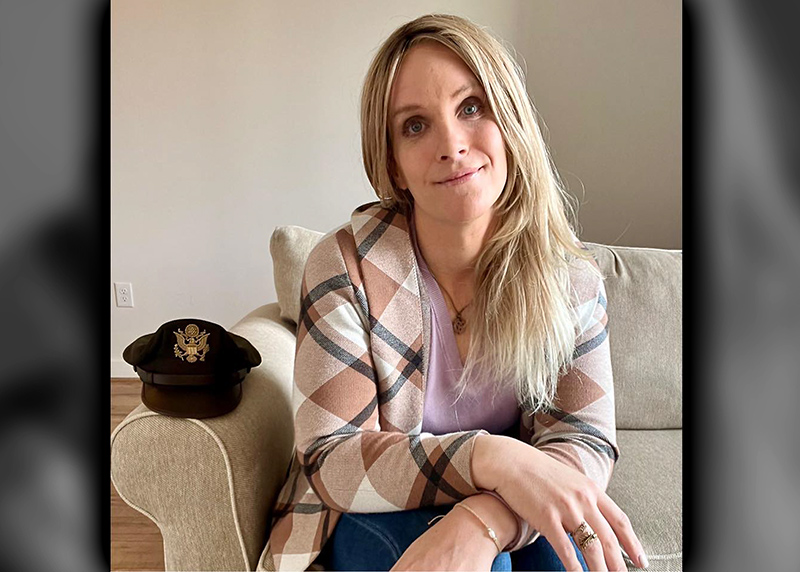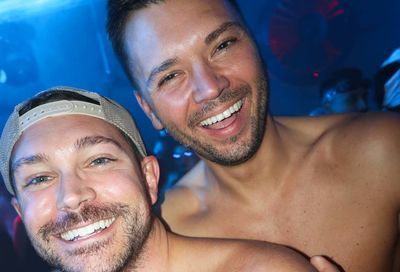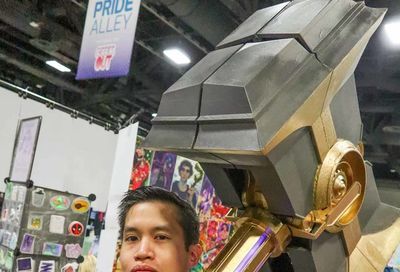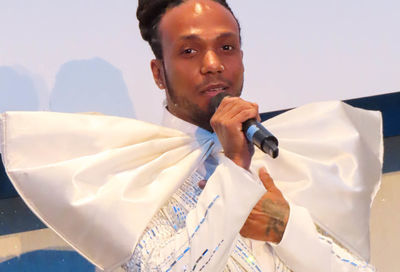Jill the Baptist
Twinbrook's Reverend Jill McCrory serves as a face of the progressive -- and LGBT-inclusive -- tradition within the Baptist faith
Jill McCrory welcomes questions. Tough questions, uncomfortable questions, questions with complex answers. The kind of questions that prompted her to leave the church for more than 20 years before returning in her 40s to enter the seminary in hopes of becoming a Baptist minister.
“You can question here, you can be cynical here, you can say, ‘I want to read more’ and ‘It doesn’t make sense to me,'” McCrory, the pastor of Rockville’s Twinbrook Baptist Church, says of her church’s attitude toward discovering one’s faith. “And that’s okay.”

Photo by Todd Franson
McCrory eschews the “fire and brimstone” archetype that has become stereotypically associated with the Baptist tradition in popular culture, opting instead to promote a nurturing, welcoming and safe environment for the members of her congregation. Nowhere has this been more evident than her stance on marriage equality and LGBT rights, where she has thrown open the doors and deliberately advertised her church as “out” when it comes to accepting LGBT congregants.
“I truly believe churches have to be out,” McCrory says. “They can’t just say, ‘Oh, we welcome everyone, and they’ll find us,’ because no other group of people have been told they’re not welcome in church…. No other group has been told, ‘You’re not good enough to come in here unless you change yourself.’ That’s why we have a banner that says ‘All Are Welcome. Really’ and march in the Pride Parade. Our logo has the rainbow on it. My business card has the rainbow on it. Our website is very out about who we are.”
Because she embraces LGBT rights, often to the surprise of those who wrongly believe Baptists have a monolithic approach to the issue, McCrory has found herself at the forefront of the equality fight. Testifying before the D.C. Council and the Maryland General Assembly on marriage equality bills, pushing for visibility for herself and other pro-LGBT pastors by marching in the Capital Pride Parade, becoming the first pastor to wed a same-sex couple on stage at the Capital Pride Festival in 2010. She even led a crowd in prayer on the steps of the U.S. Supreme Court as they awaited last year’s decision on the Defense of Marriage Act (DOMA), part of which was found to be unconstitutional.
McCrory’s biggest fight, however, is one of perception. Specifically, her effort to counter conservative members of her faith by presenting her own church as a safe haven for people to worship as their authentic selves, without fear of retribution or expulsion. It’s that effort which leaves her continually outreaching to those who have been marginalized, to welcome them back to the church.
“Every time, with regards my involvement in this movement, that I think the coolest thing has happened that will ever happen, something else occurs,” McCrory says. “So marching in this Pride contingent that continues to grow, and being a Capital Pride Hero. That was mind-boggling. Testifying in Annapolis, and then being there on the steps when Governor O’Malley signed the declaration, and going over to his house for a reception. Being invited to the White House for an LGBT leaders reception.
“Listen, I was born, grew up, raised and stayed in D.C., and consider myself the most jaded resident,” she continues. “Like, ‘Oh, yeah, that’s the motorcade, uh-huh, sure. Been there, seen it, done that, got the T-shirt.’ I was the biggest tourist in the world when I walked into the White House. And on the Supreme Court steps, being on the dais with Eugene Robinson and Dean [Gary] Hall from the National Cathedral. I think ‘That’s got to be as good as it gets,’ and then something else hits me.”
It’s not as if McCrory has remained immune to criticism, particularly from her conservative brethren in the Baptist faith. But McCrory has been lucky that she’s been able to openly share her more progressive views publicly without consequences for her church.
“I do not have anything threatening to yank my credentials, or ostracize our church out of the convention, or picket us,” she says, noting that other churches have been thrown out of their state or local Baptist conventions for adopting an LGBT-affirming stance or marrying same-sex couples. “And so I know I’m blessed.”
METRO WEEKLY: Where did you grow up? Were you raised Baptist?
REV. JILL MCCRORY: I was born and raised in Washington, D.C. I was raised in the Baptist tradition at Chevy Chase Baptist Church and was baptized there, all the good usual little Baptist things. I had what I would call a “Sunday school” Biblical education
MW: What does that mean?
MCCRORY: It’s basically the non-scholarly approach. I would say the conservative approach. And it’s simplified. There’s Adam and Eve, and there’s Noah’s Ark, but no one gets deeper into “by the way, there’s two stories about Adam and Eve” and why. And I tell you this because it’s part of why I do what I do now.
When I was about 16 or 17, I asked a hard theological question, and I didn’t get an answer. My father was Catholic, my mother was Baptist, and I asked my pastor about heaven and hell, because my father’s priest was saying that only the Catholics went to heaven and my Baptist pastor was saying that the Baptists go to heaven. I was trying to figure out: how could it be heaven if both my parents weren’t there? And I didn’t get a very good answer. I got a sort of kid’s answer, you know, “Oh, it’s okay, it’s a mystery.” I said, “Well, then, I’m not getting my questions answered here.” So I left the church and didn’t come back until I was in my 40s, over 20 years later.
MW: What made you go back?
MCCRORY: I had an experience through my mother’s major stroke, nursing home, and death, and went back to church. I was fortunate enough to be in a Sunday school class that was being taught by Carol Wilson. Carol was, at the time, in the leadership of the D.C. Baptist Convention, and she teaches like a seminary professor. She was teaching me things I had never heard — to look at things in context, and why was it written that way, and who wrote it, and what was the audience, and when was it written, and what were they trying to say. This world was opened up to me and I said, “I need to go to seminary.”
I had just started a company with a business partner, doing leadership training, and he and I both decided to go to seminary. He is a gay man, who, around the same time, had come out to his Baptist church, and they had rejected him. So, he found MCCDC — Metropolitan Community Church. We started doing leadership training for them, and through that and going to seminary and understanding more contextually, it all sort of gelled together. All my gay friends who loved God, there was nothing in Scripture that said that they were wrong. I became passionate about standing up for this community, which I consider myself a part of, even though I’m straight. I feel, as an ally, I am a part of the community, because I myself was disenfranchised from church. That’s why I tell that sort of long story — I wasn’t rejected from the church for my sexuality. I was pretty much rejected because I asked hard questions.
One of the things we’re trying to do at Twinbrook Baptist is be a church for questioners. We never tell people, “It’s a mystery.” We say, “Go look and see. It’s been a mystery for other people, too, so see how they dealt with it.” We don’t shy away from hard questions, we don’t shy away from reading all the controversial theological authors and scholars, and we don’t shy away from scholarship.
MW: You spent 20-plus years away from the church. Did you go to church at any point during that time?
MCCRORY: Yeah, sometimes, I would go to church.
MW: Baptist?
MCCRORY: No, I went to some different ones. I don’t want to diss other denominations, so let’s just say I went to another mainline denomination, and I asked, “Well, what is it you believe here?” And they actually couldn’t tell me. I still believed in God, the Church just didn’t make sense to me. Then, of course, I went to a moderate seminary — the John Leland Center, a Baptist seminary in Clarendon. There, they were very open to studying and going deeper and looking at the scholarly approach — what’s the context and who wrote it, and all that stuff.
MW: How long were you in seminary?
MCCRORY: For life. [Laughs.] Ten years. I mean, usually, it doesn’t take that long, but it was part-time.
MW: So how did you get placed in a church after seminary?
MCCRORY: I was at Chevy Chase, and then I was an intern at another church. While I was an intern at that church — it was actually a Southern Baptist church, because God has a sense of humor — I felt “called to preach.” However, that church didn’t allow women in the pulpit. The senior pastor was willing, but the deacons were not going to do it.
In the meantime, we’re doing training for MCC leaders, and I meet all these fabulous gay and lesbian and transgender pastors. I’m bemoaning that I can’t preach in my own church and one of the pastors said, “Well, come to my church and preach. You’ll know when you come preach and see if this is what you’re supposed to do.” So I did, and I preached as a Baptist. Afterwards, this young man came up to me and said, “I’ve never been to this church before, but I needed to hear what you said, as a Baptist. Thank you.” And I said to myself, “Okay, that’s it. That’s what I’m supposed to do.” That’s why I have two two-by-fours in my office, because I say God hit me with some two-by-fours. So that was the first two-by-four, that I’m calling you to preach as an ally to the LGBT community.
At the time, I thought I was the only Baptist that was like that, so I felt very ostracized. I started preaching up at Open Door MCC, in Boyds (Md.) as what we call a provisional pastor. I would go up there and preach, and I couldn’t tell this Southern Baptist church what I was doing. I sort of had to stay in my own little closet for a while. Then, I met this woman at a D.C. Baptist Convention meeting and became friendly with her and told her, “Well, you know, I’m a Baptist that thinks gays should be welcomed into church.” And she says, “Oh, I’m the pastor of a welcoming and affirming Baptist church.” I said, “A what?” She said, “Oh, there’s a whole association.” I had no idea. So, she hired me for the Washington Plaza Baptist Church in Reston. She introduced me to the Association of Welcoming and Affirming Baptists (AWAB), which I later became chair of.
So, I was at Washington Plaza Baptist for a while. And then, that pastor left, and we got an interim so I left there and went to Luther Rice Memorial Baptist Church in Silver Spring. I was an associate pastor there. That was another great church, but not “out.”
MW: What do you mean by “out”?
MCCRORY: There’s this issue of out and not out. Washington Plaza was out, a member of the association [AWAB] — and that was where we started the Pride contingent. Sandi [John] and I and the pastor from Riverside Baptist downtown, we wanted to march in the pride parade. We didn’t have enough people, so PFLAG invited us to march with them. And we had signs that said we were Baptists, and wore our clergy stoles, and it was… I mean, I had no idea.
Marching with PFLAG was an incredible experience. Of course, everybody’s excited and they love PFLAG. It took us three years to get a contingent big enough to go by ourselves. So in 10 years, we grew that to — this year — 67 Baptists, eight Baptist churches, and three vehicles. To be a huge witness. After 10 years of showing up in the Pride Parade, people still run out of that crowd in tears, and just grab you and sob. I have had so many people just sob, saying, “Thank you, thank you, thank you.” And lots of people who say, “Could I have my picture taken with you? I want to send it to my parents, to show there is a Baptist pastor,” because my sign always says “Baptist Minister for Equality.” That’s being out.
MW: Where did you go after Washington Plaza and Luther Rice?
MCCRORY: Open Door MCC lost their pastor, and they needed an interim, someone to get them to pastor search. And so, Luther Rice ordained me. I went up for two-and-a-half years and was the interim pastor of an MCC church. They found their pastor, I took a year off. Then, I found out that Twinbrook had lost their pastor and they were in an interim period, trying to decide what to do. This church had decreased, they had lost some folks through attrition, through death. I mean, it’s just a typical suburban church. So I started talking to them, and I said, “We need to be welcoming and affirming.”
The founding pastor, John Laney — who’s still alive — his vision for this church was, as he called it, “a fellowship of the concerned.” And when he first started this church in 1956, the focus of that was opening the doors wide for the African-American community. Because at the time, white churches didn’t invite that community in. He invited that community. Then, as years went by, it became what other cultures can we invite in? He left here before it was time to bring up LGBT. But when I came in and did my proposal, it went right along. In fact, I talked to him this morning, because I told him you guys were coming, and I said, “Can I use your name?” And he said, “Yes, and tell them it is still my vision,” and this goes right into the vision he had as an open and welcoming community.
Support Metro Weekly’s Journalism
These are challenging times for news organizations. And yet it’s crucial we stay active and provide vital resources and information to both our local readers and the world. So won’t you please take a moment and consider supporting Metro Weekly with a membership? For as little as $5 a month, you can help ensure Metro Weekly magazine and MetroWeekly.com remain free, viable resources as we provide the best, most diverse, culturally-resonant LGBTQ coverage in both the D.C. region and around the world. Memberships come with exclusive perks and discounts, your own personal digital delivery of each week’s magazine (and an archive), access to our Member's Lounge when it launches this fall, and exclusive members-only items like Metro Weekly Membership Mugs and Tote Bags! Check out all our membership levels here and please join us today!


























You must be logged in to post a comment.